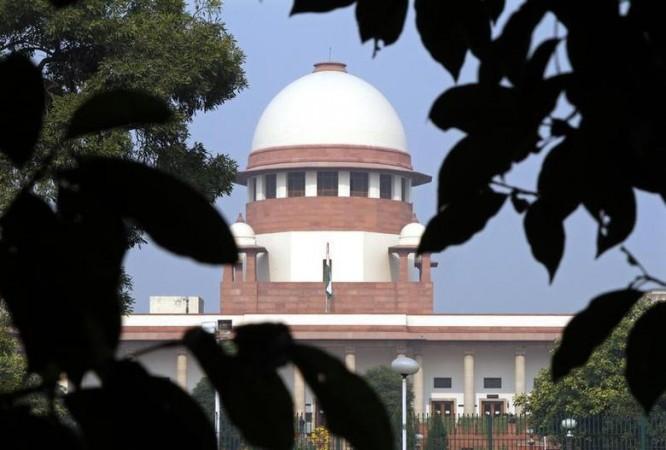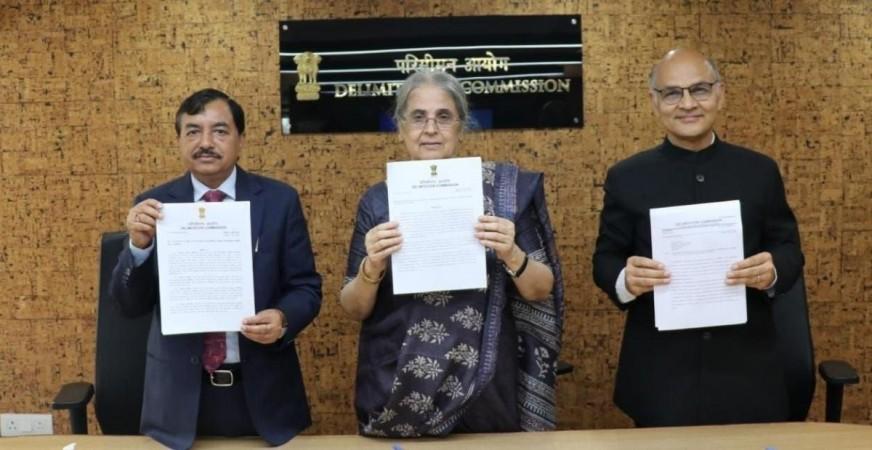The Supreme Court on Monday dismissed a plea challenging the decision of the Union Government to constitute the Delimitation Commission for redrawing the Legislative Assembly and Lok Sabha constituencies in the Union Territory of Jammu and Kashmir.
A Bench comprising Justice S.K. Kaul and Justice A.S. Oka passed the order on a plea, filed by two residents of Kashmir Valley, challenging the delimitation exercise undertaken in the Union Territory of Jammu and Kashmir under the recent notifications.
While pronouncing the verdict, Justice Oka said nothing in this judgment shall be construed as giving an imprimatur to the exercise of power under clauses one and three of Article 370 of the Constitution.

The bench observed that the issue of the validity of the exercise of power relating to Article 370 is the subject matter of petitions pending before the Supreme Court.
Petitioners argued that the delimitation exercise was against the constitution.
According to Live Law.in senior Advocate, Ravi Shankar Jandhyala, representing the petitioners had contended that the delimitation exercise was in violation of the scheme of the Constitution of India especially Article 170(3)which had frozen delimitation till the first census after 2026.
"He had argued that the delimitation exercise was being carried out in the teeth of constitutional and statutory provisions.", reports said and added that he had further submitted that after the delimitation order was passed in the year 2008, no further delimitation exercise could have been undertaken.
The senior counsel had emphasized that post-2008, all delimitation-related exercises can be carried out only by the Election Commission and not a Delimitation Commission.

Justice Oka had highlighted that though the Senior Counsel for the petitioner had orally argued that the provisions of the Jammu and Kashmir Reorganisation Act, 2019 are in the teeth of the Constitution of India, the constitutional validity of the concerned provisions of the statute has not challenged in the petition.
While opening his counterarguments, the Solicitor General of India Tushar Mehta also submit at the threshold that the constitutionality of the provisions of the Reorganisation Act has not been challenged in the present writ petition.
Two Srinagar-based residents challenged the constitution of the Delimitation Commission in J&K
Two Srinagar-based residents namely Haji Abdul Gani Khan and Dr. Mohammad Ayub Mattoo have challenged the constitution of the Delimitation Commission. The duo observed that the delimitation exercise was carried out contrary to the scheme of the constitution, and alteration of boundaries and inclusion of extended areas could not be done.
Petitioners through their lawyer argued that the delimitation exercise was in degradation by the scheme of the Constitution of India, especially Article 170(3) which had frozen delimitation till the first census after 2026.
They argued that the delimitation exercise was being carried out in the teeth of constitutional and statutory provisions. The petitioners further submitted that after the delimitation order was passed in the year 2008, no further delimitation exercise could have been undertaken. They emphasized that post-2008, all delimitation-related exercises can be carried out only by the Election Commission and not a Delimitation Commission.
The plea sought a declaration that the increase in the number of seats from 107 to 114 (including 24 seats in Pakistan-Occupied Kashmir) in Jammu and Kashmir is ultra vires the Constitutional Provisions such as Articles 81, 82, 170, 330, and 332 and Statutory Provisions, particularly under Section 63 of the Jammu and Kashmir Reorganisation Act, 2019.
Delimitation Commission was constituted in March 2020
Headed by former Supreme Court judge Ranjana Prakash Desai, the Delimitation Commission for Jammu and Kashmir was constituted by the Centre on March 6, 2020, to redraw Lok Sabha and assembly constituencies of the Union Territory.
The panel was constituted in accordance with the provisions of the Jammu and Kashmir Reorganisation Act, 2019, which bifurcated the erstwhile state into the union territories of J&K and Ladakh.
The Commission had the then Chief Election Commissioner Sushil Chandra and the then state election commissioner of Jammu and Kashmir as its ex-officio members.
Commission submitted its final report on May 5, 2022
The Jammu and Kashmir Delimitation Commission on May 5, 2022, submitted its final report to the Ministry of Home Affairs.
The panel changed the names of some Assembly constituencies and shifted a few tehsils and Patwar Halqas from one segment to another on the basis of suggestions obtained after the draft report and made the recommendation for the nomination of two Kashmiri migrants including a woman to the Legislative Assembly.
















